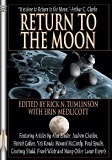FAQ #24: What do the experts say about this idea?
Esther Dyson, the world famous technology consultant, says "I like this idea. It would create a broad constituency to do something, sort of a cross-border would- be citizenry of the moon that I hope can spur governments and investors to action!"
Peter Diamandis, creator of the X Prize, says "I agree, ownership will be the only powerful driver to open our frontier."
Rosanna Sattler, the late prominent space lawyer of Posternak Blankstein & Lund of Boston said, "Although commercial space law is still in its infancy, the authors' call to enact space legislation based on the principles of the Deep Seabed Mineral Resource Act would be a great leap forward in the quest for economic expansion in the high frontier."
Dr. Jeff Fisher, Director of the Center for Real Estate Studies and Professor of Finance and Real Estate at the Indiana University School of Business, points out "How many people are rich today because their great-great-grandparents happened to have some land that at the time was not considered useful for development?"
Space Entrepreneur Gregory Bennett, says "[Land claims recognition] clears the legal path for everything we want to do in the realm beyond the sky. This may be the most realistic and achievable way to accomplish our goal of establishing permanent humansettlements on the moon. It is certainly a necessary step."
The 2011 law school textbook from Westview Press, "International Law", Silverburg, ed., contains a full chapter supporting the idea. The Space Settlement Initiative has been endorsed by the Space Colonization Technical Committee Of the American Institute of Aeronautics and Astronautics (AIAA) as well as by The Moon Society, The Artemis Society, Stephen Ashworth's Space Age, and Red Colony.

Questions & Answers about Lunar Land Claims Recognition
Note: The first 25 FAQs below are reprinted from the Space Settlement Initiative ![]() website.
website.
What is the real purpose of enacting a Lunar land claims recognition law?
What does international law say about private property ownership in space?
Can there be property ownership without national sovereignty?
What if other nations refuse to recognize land claims in space?
Why not allow smaller, limited land claims for easier steps than settlement?
Could lunar land really be worth enough money to make a difference?
What conditions should the US set for recognition of a claim?
How much land should a settlement be able to claim... and why?
Are the weaknesses and compromises in this plan likely to be permanent?
Could other sources of revenue be enough without land claims recognition?
What effect would this have on NASA and the aerospace companies?
More FAQs
The FAQs above cover basic questions about Lunar Land Claims Recognition. The following questions address more advanced issues.
If we really went to the Moon in 1969, why aren't we there now?
What were the assumptions before the Outer Space Treaty, (e.g. Robert Heinlein)?
Will changing how NASA works bring the taxpayers back on board?
Could this law force the US to recognize a foreign government's Lunar land claim?
Would Article VI of the Outer Space Treaty prohibit Lunar land claims recognition?
| Back from What do the experts say... to Frequently Asked Questions (FAQs) Back from What do the experts say... to the Space Settlement Institute home page |




